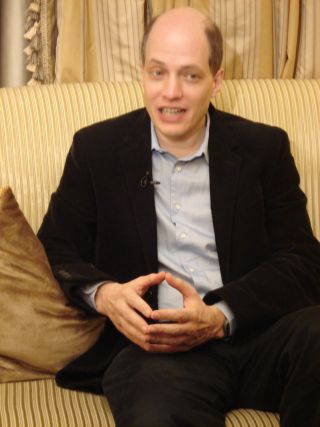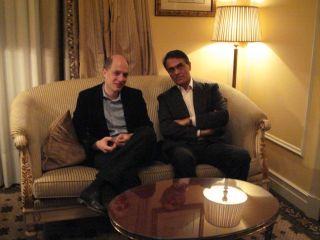You are here: The Observer
| Looking for Happiness at Work? That May Be the Problem, Says Alain de Botton November 12, 2009 -Andreas Aktoudianakis |
|
 |
Alain de Botton, the best selling author who breaks through the walls between literary genres, came to Athens to present his new book. Through The Pleasures and Sorrows of Work, an overview of ten different professions, de Botton uncovers the beauty and the beast hiding in the contemporary work environment. Dr. Haris Vlavianos, Deree professor, poet, and director of the journal Poiitiki, introduced de Botton to the audience at the Hotel Grande Bretagne. “De Botton, in my opinion, is the author who dares to record the platitude only to highlight it for what it really is: an element that affects and shapes modern life,” said Vlavianos. |
In his book, de Botton crucifies the modern platitude-cum-mentality that a job is a kind of liberation that makes you become creative, the hero of the workplace. On the contrary, de Botton concludes that most people are not only condemned to be alienated from themselves, but also to accept this condition as an inevitable consequence of work. “The dream is that you find a job that enables you to take something precious in you and put it out in the world,” de Botton told The Observer after his lecture. “But most of us think ‘my job is so much more to me than my job allows me to express’ - and that’s the humiliation of work.” In search of what makes jobs either self-fulfilling or soul-destroying, de Botton leads us on a journey around a deliberately eclectic range of occupations, from rocket science to biscuit manufacture. Through this selection, de Botton wants to show that no matter the work environment, most employees cannot find meaning in what they do, because what they do amounts to only a very small part of the whole process. “Many of the people with whom I spoke in the biscuit industry had never seen the biscuit in front of them - they knew that they were producing biscuits but had never seen them,” said de Botton. While all societies have had work as a central function of everyday life, today’s Western societies are the first to suggest that work is something more than a punishment and that we should seek it out even in the absence of a financial imperative, de Botton observes in his book. Moreover, our choice of occupation has become a part of our identity to the extent that when we meet new people instead of asking them where they come from or who they are, we ask them what they do, assuming that a meaningful existence is invariably connected to what we do for a living. “But all of us are much more than one thing,” said de Botton. “Of course we all know people who are very satisfied with their work, but they are not the majority, they are a beautiful, lucky minority.” Most of the people at de Botton’s lecture at the Hotel Grande Bretagne sympathized with the points the author made, often laughing out loud at his hilarious approach to serious matters; like that we envy people to whom we can relate to, which is why we don’t envy Queen Elizabeth or President Obama. De Botton is now working on a book about religion and all those things that a society loses when it becomes secular, things like morality, art and architecture. “The thing is, can we hold on to some of that without believing in anything supernatural? That’s the challenge,” he said. Among his other best-selling books are How Proust Can Change Your Life (1997), Consolation of Philosophy (2000), The Art of Travel (2001), Status Anxiety (2004) and The Architecture of Happiness (2006). De Botton was born in Zurich in 1969 and lives in London. He is an essayist whose books have been described as a “philosophy of everyday life.” He has written on love, travel, architecture and literature, and his books have been bestsellers in 30 countries. He started, and helps to run, a school in London called The School of Life, dedicated to a new vision of education that includes showing how philosophy is relevant to problems of everyday life. Aside from writing, de Botton has been involved in making a number of television documentaries, and helps to run a production company, Seneca Productions. |
|
Alain de Botton. |
|
Alain de Botton (left), and Dr. Haris Vlavianos. |
|


